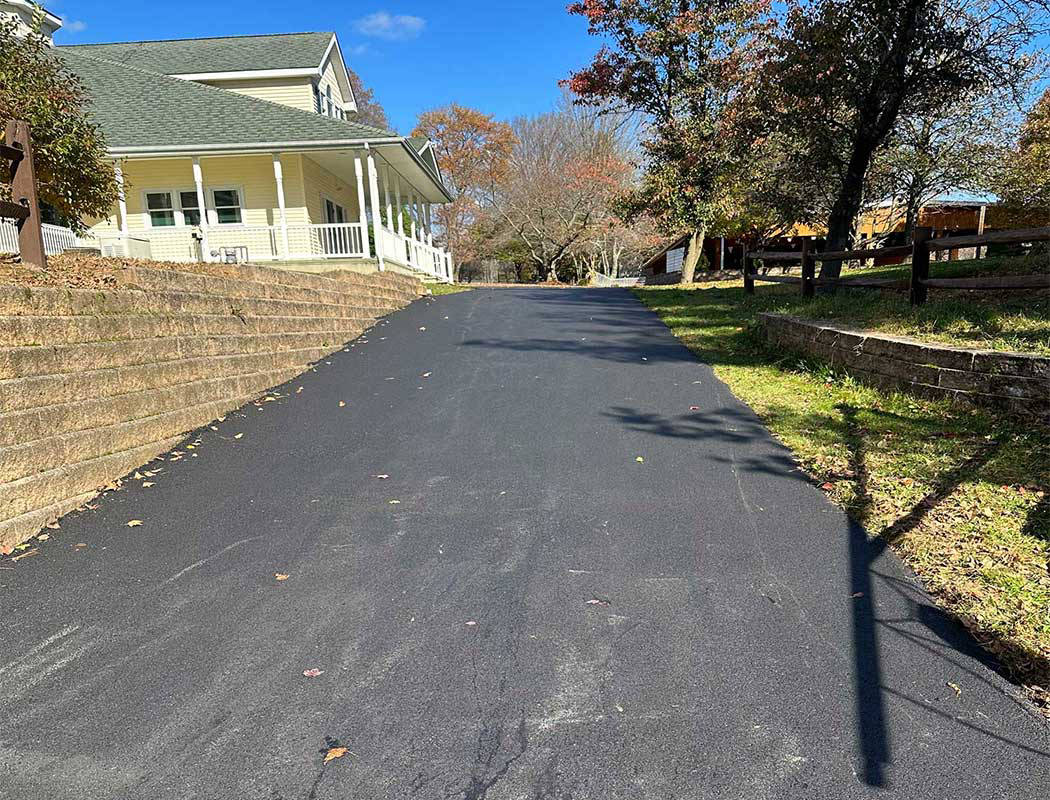Summary:
Morris County winters demand proactive driveway care. Learn essential asphalt maintenance strategies that prevent expensive repairs and keep your pavement functional through harsh weather conditions.
Morris County winters bring more than just scenic snowfall—they deliver a relentless assault on your driveway that can transform minor surface imperfections into major structural problems. When temperatures plummet below freezing and snow accumulates across your asphalt pavement, water penetrates existing cracks and expands, creating the freeze-thaw cycle that destroys driveways from within. Your driveway faces unique challenges in this region, where temperature fluctuations between 20°F and 45°F throughout winter months create constant expansion and contraction stress on asphalt surfaces. Understanding how winter weather impacts your pavement—and taking preventive action before the first snowfall—can save you thousands in emergency repairs come spring. Professional asphalt maintenance isn’t just about aesthetics; it’s about protecting one of your property’s most significant investments from the harsh realities of New Jersey winters.
How Morris County Winter Weather Damages Asphalt Pavement
Morris County’s winter climate creates a perfect storm of conditions that systematically break down asphalt pavement through multiple destructive processes. Water infiltration represents the primary threat to your driveway’s structural integrity, beginning when moisture seeps into hairline cracks that measure less than 1/8 inch wide. Once temperatures drop below 32°F, this trapped water expands by approximately 9%, creating hydraulic pressure that widens existing cracks and forms new fractures throughout the asphalt matrix. The freeze-thaw cycle repeats dozens of times throughout Morris County winters, with each cycle progressively weakening the bituminous binder that holds aggregate materials together. Salt applications compound this damage by accelerating the chemical breakdown of asphalt compounds, particularly when sodium chloride concentrations exceed 15% in direct contact with pavement surfaces. Heavy snow loads add additional stress, with each inch of wet snow exerting roughly 1.25 pounds per square foot of pressure on already compromised asphalt structures.
Temperature Fluctuation Effects on Driveway Surfaces
Morris County experiences an average of 45 freeze-thaw cycles each winter season, creating constant thermal stress that fatigues asphalt pavement materials. When temperatures rise above freezing during sunny afternoons, asphalt expands and becomes more flexible, only to contract rapidly when evening temperatures drop back below 30°F. This thermal cycling breaks down the adhesive bonds between aggregate stones and asphalt cement, leading to raveling—the progressive loss of surface material that begins as small pebbles loosening from the pavement surface and eventually exposes larger aggregate stones underneath.
Ice Damage and Salt Corrosion Patterns
Morris County experiences an average of 45 freeze-thaw cycles each winter season, creating constant thermal stress that fatigues asphalt pavement materials. When temperatures rise above freezing during sunny afternoons, asphalt expands and becomes more flexible, only to contract rapidly when evening temperatures drop back below 30°F. This thermal cycling breaks down the adhesive bonds between aggregate stones and asphalt cement, leading to raveling—the progressive loss of surface material that begins as small pebbles loosening from the pavement surface and eventually exposes larger aggregate stones underneath.
Pre-Winter Asphalt Maintenance Strategies That Work
Effective winter preparation for your Morris County driveway begins with systematic crack sealing using hot-applied rubberized asphalt sealant that remains flexible at temperatures down to -20°F. Professional crack sealing involves routing cracks to a uniform width of 3/8 inch and depth of 1/2 inch, then filling with high-grade polymer-modified sealant that bonds chemically with existing asphalt surfaces. Surface preparation requires power washing to remove all debris, oils, and loose material before applying primer that penetrates 1/4 inch into surrounding asphalt. Sealcoating application follows a specific protocol: two thin coats of coal tar emulsion or acrylic-based sealer applied 24 hours apart when ambient temperatures remain above 50°F for 48 consecutive hours. This process creates a waterproof barrier that prevents moisture infiltration while providing UV protection that extends asphalt life by 3-5 years. Proper drainage assessment involves checking that water flows away from pavement surfaces at a minimum grade of 2% and clearing all drainage structures of debris that could cause standing water during freeze-thaw cycles.
Professional Crack Sealing Techniques and Materials
Professional crack sealing utilizes specialized equipment that heats rubberized asphalt sealant to precisely 375°F, creating optimal viscosity for deep penetration into crack structures. The process involves using crack routing machines with diamond-tipped blades to create uniform crack geometry, followed by compressed air cleaning to remove all loose debris. High-quality sealants contain recycled rubber particles and polymer modifiers that maintain elasticity through temperature ranges from -30°F to 140°F, preventing the cracking and separation that occurs with inferior materials.
Drainage Improvement Methods for Winter Protection
Proper drainage prevents the standing water that accelerates winter damage by installing French drains along driveway edges and maintaining a minimum 1/4 inch per foot slope away from structures. Professional drainage solutions include permeable edge treatments using 3/4 inch crushed stone and fabric barriers that allow water infiltration while preventing soil migration. Strategic placement of catch basins and channel drains redirects surface water before it can pool and freeze, eliminating the hydrostatic pressure that causes pavement heaving and cracking.
Protect Your Investment with Professional Asphalt Services
Your Morris County driveway represents a significant investment that deserves protection from winter’s destructive forces through proper maintenance and professional care. Taking proactive steps now—including crack sealing, surface treatment, and drainage improvements—prevents the costly repairs that result from neglected pavement maintenance. Professional asphalt services provide the expertise, materials, and equipment necessary to winterize your driveway effectively, using proven techniques that extend pavement life and maintain functionality through harsh weather conditions. Don’t wait until spring reveals expensive damage that could have been prevented with proper preparation. Contact us today to schedule your pre-winter driveway assessment and maintenance service, protecting your investment and providing safe, reliable access throughout the winter months ahead.

